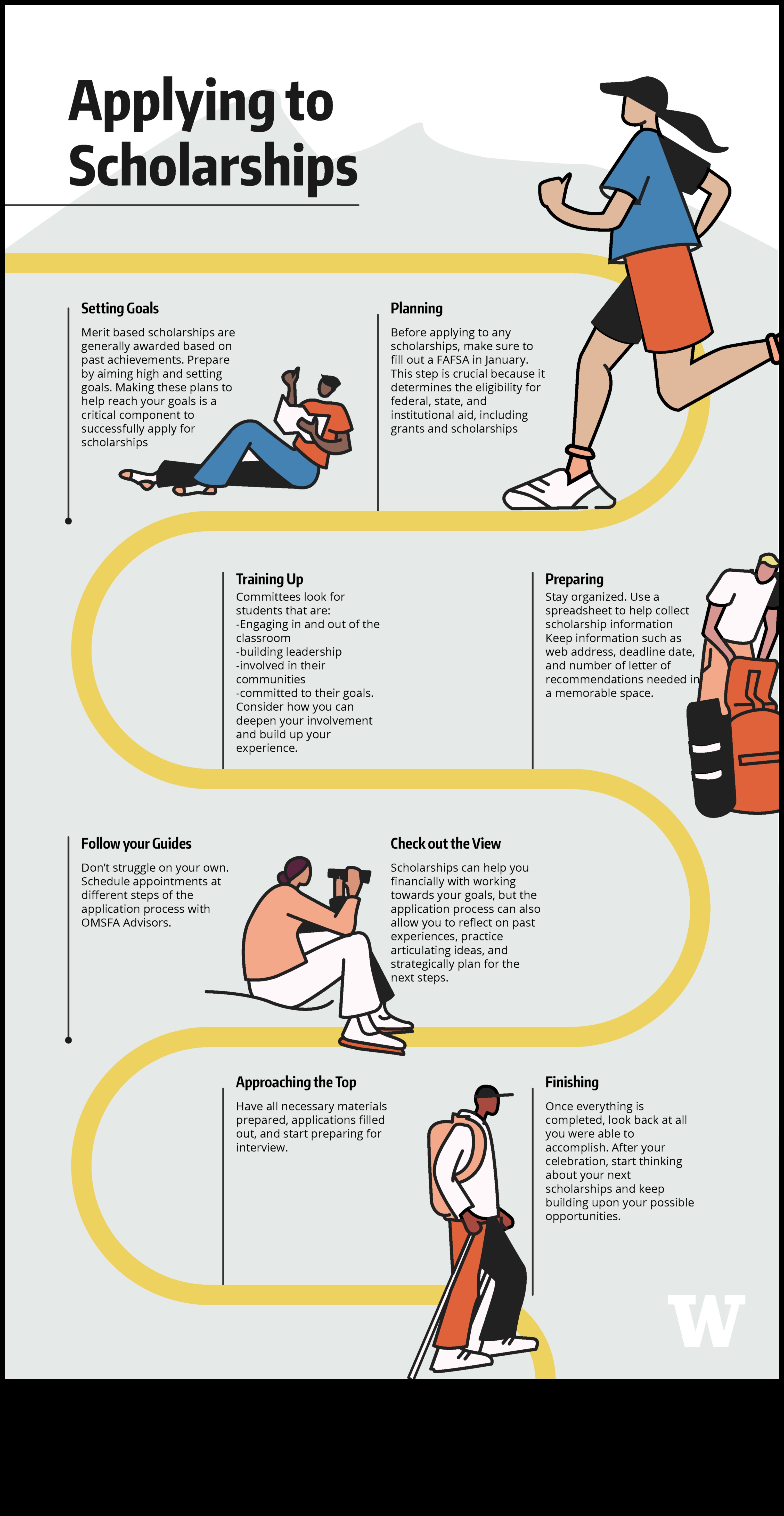
How to Get Scholarships
Scholarships are a great way to pay for college or other educational expenses. There are many different types of scholarships available, and they can be awarded based on a variety of factors, such as academic merit, financial need, or extracurricular activities.
If you’re interested in applying for scholarships, there are a few things you can do to increase your chances of success. First, start early. The best time to start looking for scholarships is in the fall, before the majority of students start applying.
Second, do your research. There are many different scholarship directories available online, such as the College Board’s Scholarship Search and Fastweb.com. These directories can help you find scholarships that you’re eligible for.
Third, write a strong scholarship essay. Many scholarships require applicants to submit an essay as part of their application. This is your chance to show the scholarship committee why you deserve to be awarded the scholarship. Take your time writing your essay, and make sure it’s well-written and error-free.
Fourth, be prepared to interview. Some scholarships require applicants to interview with the scholarship committee. If you’re invited to an interview, dress professionally and be prepared to answer questions about your academic record, extracurricular activities, and goals for the future.
Finally, don’t give up. The process of applying for scholarships can be long and challenging, but it’s worth it if you’re able to secure a scholarship that will help you pay for college.
| Feature | Answer |
|---|---|
| Scholarship | A monetary award given to a student or student organization to help pay for education. |
| Financial aid | Assistance provided to students to help pay for college or university expenses. |
| College | A post-secondary educational institution that offers undergraduate degrees. |
| University | A post-secondary educational institution that offers undergraduate and graduate degrees. |
| Apply | The process of submitting an application for a scholarship or other form of financial aid. |

2. Types of Scholarships
There are many different types of scholarships available, each with its own set of criteria. Some of the most common types of scholarships include:
- Academic scholarships
- Athletic scholarships
- Music scholarships
- Art scholarships
- Leadership scholarships
- Community service scholarships
- Financial need scholarships
It is important to research the different types of scholarships available before you start applying. This will help you to identify the scholarships that you are most likely to qualify for.
You can find information about scholarships on the websites of colleges and universities, as well as on scholarship search engines.
3. How to Find Scholarships
There are many different ways to find scholarships. Here are a few tips:
- Start by doing a general search online. There are many websites that list scholarships, such as Scholarships.com and Fastweb.
- Check with your school’s financial aid office. They may have a list of scholarships that are specific to your school or to your major.
- Talk to your teachers, counselors, and other adults who may know about scholarships. They may be able to give you leads on scholarships that you wouldn’t have found otherwise.
- Look for scholarships that are specific to your interests or background. For example, if you are a member of a minority group, there may be scholarships available to you.
- Apply for as many scholarships as you qualify for. The more scholarships you apply for, the more likely you are to win one.

4. Applying for Scholarships
Applying for scholarships can be a time-consuming and challenging process, but it is well worth the effort if you are able to secure financial assistance for your education. Here are a few tips to help you get started:
- Start early. The sooner you start applying for scholarships, the more time you will have to research and complete applications.
- Be organized. Keep track of all of your applications in one place, and make sure to meet all of the deadlines.
- Write strong essays. Scholarship essays are your chance to show admissions committees why you deserve their financial assistance. Take your time writing your essays, and make sure that they are well-written and error-free.
- Network. Talk to your teachers, counselors, and other mentors about scholarships that you might be eligible for. They may be able to connect you with scholarships that you would not have found otherwise.
- Don’t give up. The scholarship application process can be tough, but don’t give up if you don’t get the results you want the first time around. Keep applying for scholarships, and eventually you will find one that you are eligible for and that you win.

5. Scholarship Essay Tips
When applying for scholarships, you will often be required to submit an essay. This is your chance to show the scholarship committee why you are a deserving candidate. Here are some tips for writing a scholarship essay that will impress the judges:
- Start by brainstorming ideas about what you want to write about.
- Once you have a few ideas, choose the one that you are most passionate about and that you can write about most eloquently.
- Start writing your essay early and give yourself plenty of time to revise and edit it.
- Make sure your essay is well-written and free of errors.
- Proofread your essay carefully before submitting it.
Here are some additional tips for writing a scholarship essay:
- Personalize your essay by writing about your own experiences and motivations.
- Show the judges why you are a unique and valuable candidate.
- Be creative and make sure your essay stands out from the rest.
- Emphasize your strengths and accomplishments.
- Be honest and genuine.
Writing a scholarship essay can be a challenging task, but it is also an opportunity to show the judges why you deserve their scholarship. By following these tips, you can write an essay that will impress them and help you win the scholarship.
6. Scholarship Interview Tips
When you are invited to interview for a scholarship, it is an important opportunity to show the scholarship committee that you are a qualified and deserving candidate. Here are some tips for preparing for and conducting a successful scholarship interview:
- Do your research on the scholarship and the organization that is awarding it. This will help you to answer questions intelligently and show that you are genuinely interested in the scholarship.
- Practice your answers to common interview questions. You can find a list of common scholarship interview questions online or in books.
- Dress professionally for the interview. This will show the scholarship committee that you are serious about the scholarship and that you take it seriously.
- Be yourself during the interview. The scholarship committee wants to get to know the real you, so don’t try to be someone you’re not.
- Be prepared to answer questions about your academic and extracurricular achievements. The scholarship committee wants to know what you have to offer and why you are a good candidate for the scholarship.
- Be prepared to answer questions about your goals and aspirations. The scholarship committee wants to know what you plan to do with the scholarship and how it will help you to achieve your goals.
- Thank the scholarship committee for their time and consideration.
By following these tips, you can increase your chances of making a good impression on the scholarship committee and winning the scholarship.
7. Scholarship Award Letters
When you receive a scholarship award letter, it is important to read it carefully and understand all of the terms and conditions. Some of the things you should look for in a scholarship award letter include:
* The name of the scholarship and the organization that is awarding it.
* The amount of the scholarship and the terms of the award.
* The deadline for accepting the scholarship.
* The requirements for maintaining the scholarship.
* The contact information for the organization that is awarding the scholarship.
Once you have read and understood the terms and conditions of the scholarship award letter, you should sign and return the acceptance form as soon as possible. This will ensure that you are eligible to receive the scholarship and that you meet all of the requirements.
If you have any questions about the scholarship award letter, you should contact the organization that is awarding it. They will be able to provide you with more information and help you to understand the terms and conditions of the award.
Scholarship Renewals
Scholarship renewals are the process of reapplying for a scholarship that you have already received. This process is typically required for scholarships that are awarded for a specific period of time, such as one year or two years.
The renewal process for scholarships can vary depending on the specific scholarship, but there are some general steps that you can follow to ensure that your application is successful.
First, you will need to check the scholarship website or contact the scholarship administrator to find out if the scholarship is renewable and what the renewal requirements are.
Once you know the renewal requirements, you will need to gather the necessary materials to complete your application. This may include your academic transcript, a letter of recommendation, and a statement of purpose.
You will also need to write a new scholarship essay that addresses the renewal criteria. This essay should highlight your academic achievements and extracurricular activities since you first received the scholarship.
When you are finished writing your application, you will need to submit it to the scholarship administrator by the deadline.
The renewal process for scholarships can be competitive, so it is important to make sure that your application is as strong as possible. By following these tips, you can increase your chances of successfully renewing your scholarship.
9. Scholarship Tax Implications
When you receive a scholarship, it is important to understand the tax implications. Scholarships are generally considered to be tax-free income, but there are some exceptions. For example, scholarships that are used to pay for room and board may be taxable. Scholarships that are used to pay for tuition and fees are generally tax-free.
If you receive a scholarship that is taxable, you will need to report it on your income tax return. The amount of tax you owe will depend on your other income and deductions.
You can find more information about the tax implications of scholarships on the IRS website.
10. FAQ
Q: What is a scholarship?
A scholarship is a financial award given to students who meet certain criteria, such as academic achievement, financial need, or extracurricular activities. Scholarships can be awarded by colleges, universities, private organizations, and even businesses.
Q: What are the different types of scholarships?
There are many different types of scholarships, each with its own set of criteria. Some of the most common types of scholarships include:
* Academic scholarships are awarded based on academic achievement, such as GPA or test scores.
* Need-based scholarships are awarded to students who demonstrate financial need.
* Merit-based scholarships are awarded to students who have demonstrated excellence in a particular area, such as athletics or the arts.
* Diversity scholarships are awarded to students who come from underrepresented groups.
Q: How do I find scholarships?
There are many ways to find scholarships. Some of the best places to start include:
* The scholarship search engine at Fastweb
* The scholarship database at Scholarships.com
* The scholarship listings at CollegeBoard
* The scholarship pages at your college or university
* The scholarship pages of your local community organizations